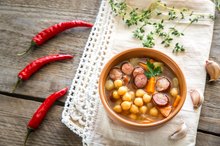What does fact checked mean?
At Healthfully, we strive to deliver objective content that is accurate and up-to-date. Our team periodically reviews articles in order to ensure content quality. The sources cited below consist of evidence from peer-reviewed journals, prominent medical organizations, academic associations, and government data.
- "Platelets"; Effects of Kiwi Fruit Consumption on Platelet Aggregation and Plasma Lipids in Healthy Human Volunteers; A.K. Duttoroy and A. Jørgensen; August 2004
- "Platelets"; Effects of Kiwi Fruit Consumption on Platelet Aggregation and Plasma Lipids in Healthy Human Volunteers; A.K. Duttoroy and A. Jørgensen; August 2004
- Clinical Center, National Institutes of Health; Coumadin and Vitamin K; 2003
The information contained on this site is for informational purposes only, and should not be used as a substitute for the advice of a professional health care provider. Please check with the appropriate physician regarding health questions and concerns. Although we strive to deliver accurate and up-to-date information, no guarantee to that effect is made.
Should I Eat Kiwi Fruit If I Take Blood Thinners?
You may know that garlic is a natural blood thinner, but you may not know that kiwi fruit also acts as a natural blood thinner to help prevent blood clots. Kiwi fruit is also high in vitamin K. If you're already taking blood thinners to improve heart health, you should talk to your doctor about whether it's safe for you to eat kiwi fruit while taking your medication.
Blood Thinners
Blood thinners, also called anticoagulants, reduce your risk of having a heart attack or stroke by helping to prevent clots of blood from forming in your veins and arteries. It is often prescribed to people with a history of irregular heartbeat, congestive heart failure and obesity. Coumadin and heparin are examples of blood thinners. Certain foods or medications can increase or decrease the effectiveness of your blood thinner, such as kiwi fruit.
- Blood thinners, also called anticoagulants, reduce your risk of having a heart attack or stroke by helping to prevent clots of blood from forming in your veins and arteries.
- Certain foods or medications can increase or decrease the effectiveness of your blood thinner, such as kiwi fruit.
Kiwi Fruit and Platelet Aggregation
What Fruits & Vegetables Are Excellent for Thinning the Blood?
Learn More
A 2004 randomized crossover study published in the journal "Platelets" investigated the effects of kiwi fruit on platelet aggregation, or blood clotting, and plasma lipid levels in a group of human volunteers 1. The participants consumed two to three kiwi fruit each day for 28 days. The study found that kiwi fruit reduced platelet aggregation by 28 percent when compared to the control group. If you're taking a blood thinner and eating kiwi fruit, the addition of the fruit may cause your blood to be too thin, which can be serious if you cut yourself and cannot stop the bleeding.
- A 2004 randomized crossover study published in the journal "Platelets" investigated the effects of kiwi fruit on platelet aggregation, or blood clotting, and plasma lipid levels in a group of human volunteers 1.
Vitamin K
While certain foods and medications increase the effectiveness of your blood thinner, vitamin K actually decreases its effectiveness. However, you only need to be concerned with vitamin K in your diet if you are taking either Coumadin or Warfarin. Vitamin K helps promote blood clotting, counteracting the medication. You do not need to avoid foods with vitamin K, but it is recommended that you eat the same amount every day. Consuming too much or too little vitamin K on any given day can cause your blood to become too thick or too thin.
- While certain foods and medications increase the effectiveness of your blood thinner, vitamin K actually decreases its effectiveness.
Vitamin K in Kiwi Fruit
Can Certain Fruits and Vegetables Reduce Blood Clots?
Learn More
Kiwi fruit is considered a food that is moderately high in vitamin K. A 1-cup serving contains 72.5 mcg of vitamin K, providing 90 percent of your daily value. When taking Coumadin, it is recommended that you limit your intake of moderately high vitamin K foods to less than three servings a day. Lettuce, broccoli and spinach are also considered moderately-high sources of vitamin K.
Related Articles
References
- "Platelets"; Effects of Kiwi Fruit Consumption on Platelet Aggregation and Plasma Lipids in Healthy Human Volunteers; A.K. Duttoroy and A. Jørgensen; August 2004
- USDA National Nutrient Database for Standard Reference: Kiwifruit, Green, Raw
- Forastiere F, Pistelli R, Sestini P, Fortes C, Renzoni E, Rusconi F, Dell'Orco V, Ciccone G, Bisanti, L, the SIDRIA Collaborative Group, Italy (Italian Studies on Respiratory Disorders in Children and the Environment). Consumption of fresh fruit rich in vitamin C and wheezing symptoms in children. Thorax. 2000;55(4):283-8. doi:10.1136/thorax.55.4.283
- Wang J, Vanga SK, Mccusker C, Raghavan V. A comprehensive review on kiwifruit allergy: Pathogenesis, diagnosis, management, and potential modification of allergens through processing. Comprehensive Reviews in Food Science and Food Safety. 2019;18(2):500-513. doi:10.1111/1541-4337.12426
Writer Bio
Jill Corleone is a registered dietitian and health coach who has been writing and lecturing on diet and health for more than 15 years. Her work has been featured on the Huffington Post, Diabetes Self-Management and in the book "Noninvasive Mechanical Ventilation," edited by John R. Bach, M.D. Corleone holds a Bachelor of Science in nutrition.









